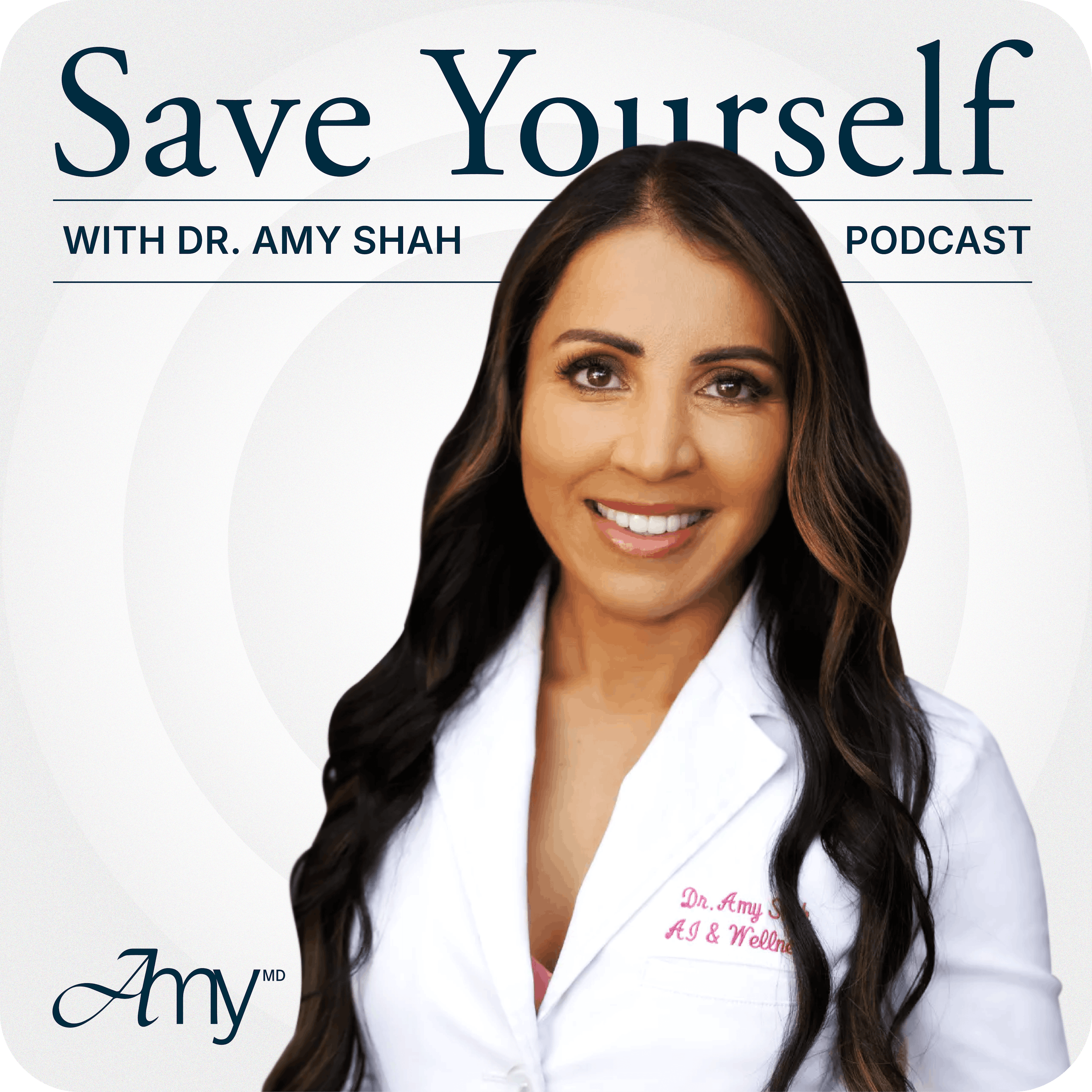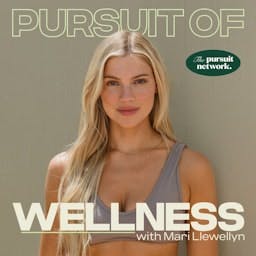.jpg)
Mindfully Integrative Show
Welcome to the Mindfully Integrative Podcast! We are dedicated to featuring inspirational and successful individuals who have embraced mindful investing to achieve optimal integrative wellness. Our podcast dives into all aspects of mindfully incorporating integrative functional health into our lives, aiming to help create a more balanced and fulfilling life. New episodes are released every Friday and cover a wide range of informative and entertaining topics, interviews, and discussions.
We explore a mindful approach to the mind-body connection with guests discussing various topics in integrative holistic health. This includes areas such as whole health, functional medicine, spiritual health, financial health, mental health, lifestyle health, mindset shifts, physical health, digital health, nutrition, gut health, sexual health, body positivity, family health, pet health, business health, and life purpose, among others.
Dr. Damaris G. is an Integrative Doctor of Nursing Practice, a Family Nurse Practitioner, a mom, and a veteran. For collaboration, interviews, or to say hi, you can contact her via email at damaris@mindfullyintegrative.com. You can also find her on LinkedIn at or https://www.linkedin.com/in/damarisdnp/. To join our membership and access resources, visit our website at https://mindfullyintegrative.com .
Please note that the information shared here is for informational and educational purposes only and should not be considered medical advice. Always consult with a physician or other licensed healthcare provider when making healthcare decisions. Enjoy the podcast!
Mindfully Integrative Show
Your Gut Microbiome Directly Impacts GLP-1 Production and Weight Management
Sponsor Affiliates
Empowering Your Health
Get YOUR Own
Joburg Protein Snacks
Discount Code: Damaris15 Or Damaris18
Feeling need to Lose Weight & Become metabolically Healthy
GET METABOLIC COURSE GLP 1 REseT
This course is designed for individuals looking to optimize their metabolic health through integrative and functional medicine approaches. Whether you're on a GLP-1 medication or seeking natural ways to enhance your metabolic function, this course provides actionable steps, expert insights, and a personalized roadmap sustainable wellness.
Are you feeling stressed, tired, or Metabolism imbalanced?
Take advantage of our free mindful steps to help improve your well-being.
ENJOY ONE OF our Books
Mindful Ways Health Wealth & Life
https://stan.store/Mindfullyintegrative
Join Yearly membership ALL IN ONE FUNCTION HEALTH
Ask Us for help...
Hi, how are you so on this lesson? This is talking about and we're discussing, of course, glp-1s and the impact on our metabolic health and this is the connection and the use of supplements with metabolic health and understanding its connection in our gut and our health and how it is promoting or need for supplement or what is the use of the supplements and probiotics. So it depends, right. Sometimes you can get supplementation by most of the time I'd like you to get supplementation from your food and if not, your body may still need more. So integrating supplements like probiotics, omega-3 fatty acid and adaptogens can be super important for uptick of the GLP-1s. This helps in metabolic health by adding more of a versatile weight control, appetite control and maybe even inflammatory issues. Now, this is dependent, right. So understanding why we need it is because the gut and inflammation, so JLP ones, like I said, they regulate the blood sugar, help with regulating blood sugar, control the appetite, enhance insulin sensitivity and support fat metabolism. When you're taking certain supplements or food nutrients such as probiotics, the omega-3s and adaptogens, that helps boost it naturally and support metabolic balance. So mic probiotics are given when you're having maybe either not enough of a certain probiotic or there's a disbalance or dysbiosis within the gut microbiome that you need to have it set back. It needs to be in balance. Now the role of this is to benefit quality gut microbiome balance. It's crucial for that because GLP ones are secreted in the L cells. They secrete else cells of the small intestines. If you don't have a good, healthy gut biome then you're not going to be secreting the right things. The floodgates, or shall we say the linings, of the small intestines, large intestines, gi tract, will not be. They either will be inflamed or their interjunctions are just not at like a nice, a nice gate. Their floodgates are open and everything is coming in. It's not balanced. So when you have proper nutrient-dense foods or probiotics to help balance that out, additionally, this increases the short chain fatty acids. That stimulates GLP-1s, which is foods like fibrous foods that you can eat. So when I talk about supplements I also mean to discuss that nutrition is always very paramount. But there is certain individuals and most of us in some manner will need to supplement because over time our lining will degrade. Over time we eat foods that are not of the right amounts or the nutritional value also genetic issues. So the probiotics that we do take in is important. Reducing the gut inflammation is important and helps with decreasing GLP suppression and it enhances insulin sensitivity, which we've discussed before. But the best probiotics for GLP-1 and for metabolic health are these are the top three. There are more, but this is have been researched significantly lactobacillus rhamnosus, and that supports weight loss and appetite control. In addition, obviously the GLP-1s, when it's secreted properly, will do this, but it needs this probiotic within the body and a good balance. Bifidobacterium brevet enhances fat metabolism and reduces inflammation, which means you're going to have less malabsorption within the body, you're going to be absorbing more nutrients and your body's going to do what it needs to do Acromansia muncephalia. That is in the colon and it's actually pretty difficult to get, but now there has been a supplement that has been now able to reproduce acromansia probiotic and that increases the GLP-1 and insulin sensitivity. So these supplements are natural options that will help and boost the GLP-1 in your body with nutrition and if medications are needed for some, and if medications are needed for some Now the best probiotic foods that you can take are fermented foods like kimchi, sauerkraut, yogurt, kefir.
Speaker 1:High quality probiotics are always needed and I say at least 10 strains, at least 10 billion CFUs, colony forming units and should have even a prebiotic if that's possible. Prebiotics are rich fibrous foods that help feed the bacteria. So you need prebiotics to help feed the bacteria, like garlic, onions, bananas, and when you pair good fiber and probiotics together you've got your gut is happy. Your gut is happy. Like a bone broth and some kimchi or a sauerkraut, your gut is happy. Another one that I would use in overall is trying to increase your butyrate. I was saying before short chain fatty acids. That has to do with your fibrous foods. So the more fibrous foods that you got, good quality, with hydration, if you can tolerate it, if you're not an ulcerative colitis or a Crohn's, see where that is for you, and if it needs to be pureed and stuff let's.
Speaker 1:Let's chat about omega-3. Omega-3 fatty acids reduce the inflammation in the GLP ones and support GLP ones. Why do they do that? Because EPA and DHA have major, major anti-inflammatory properties and enhance insulin sensitivity and gut function. Trust me, when you're looking at the omega cascade and you're looking at our cells, the phospholipid layers need, need, need omega-3. It needs the fat. It helps with protection of the cells. So when you have the right amount it reduces your chronic inflammation, it protects the gut lining, but it also protects a lot of part of the body Inflammatory wise, improves your hormone function, enhancing insulin sensitivity and improves the overall effectiveness. Now think of it like the better sources of omega-3 is fatty fish, chia seeds If you're vegan flax seeds, walnuts. You can use high quality fish oil supplements I usually use. I'm not trying to give any brands, but a high quality brand would be. Tip wise take the omega-3 with meals for better absorption. Now, if you have a blood thinner or you have a blood disorder, taking omega-3s need to be advised by your doctor always because you want to make sure, because it can be a blood thinner and you want to make sure that it is okay to take, or if you're having any sort of procedures and stuff. So anything that you're taking in your body, you just want to be sure that it's safe.
Speaker 1:Adaptogens one of my other favorite supplements slash herbs. So think stress reduction. Think your stomach and your GI system is your second immune system has. This is where serotonin is produced between the brain, the gut and brain barrier connection. Think of it like this the less stress you are, the less chronic stress you have will actually increase the GLP-1. The more stress you have will decrease the GLP-1, which then usually you'll hear people say I have a lot of stress and I had that cortisol weight. It is very, very common You'll have more cravings when you have chronic stress. You have more emotional eating, insulin resistance goes up, blood sugar dysregulation, you have poor gut health and it lowers GLP production. So you know we're talking about gut health, they're talking about trying to improve it.
Speaker 1:The role of those adaptogens and herbs. So, first off, let's say it's herbs, right, so you don't have to take a supplement. You can take herbs and teas. Now, adaptogens are herbs that help adapt to stress, support hormonal balance and gut health. Stress support hormonal balance and gut health and, of course, glp-1 function. Main ones are. The big ones that you'll hear about are ashwagandha. It lowers cortisol, enhances insulin sensitivity. With ashwagandha, you want to make sure, though it is an immune booster, so it has to be. If you have an immune suppressed body or there's things that you're taking, you have to make sure that your doctor is aware that you're going to take a dose of ashwagandha, or how much, so that it doesn't overreact or you don't have an overreactive immune system. If it's at the right balance, you should be fine.
Speaker 1:Rhodiola rosea supports metabolism, and holy basil. You can get these in tea forms. You can get them in supplement or you can actually just take them from nature and put it in a nice quality loose tea. Best ways to take them usually a tea or smoothie or a tincture. I do most of mine in tincture or a supplement. If I have a nice blend tea, I will do that in midday If it's available to me, or I'll just do a nice tincture under my tongue or with some warm water. Um, think of it like the body's natural way for anxiety or Xanax, you know it's. It's a better option than um taking a bunch of pills to control the way you feel. Um incorporates a way of getting you reset.
Speaker 1:Now, another way other than just taking herbs, is learning about meditation, yoga and what it can do for your body. Incorporating ways to de-stress is so important. I will be writing, and in the process of writing, a book on stress transformation and how important stress is on the body and what it can do to your health. So if you don't realize that you know, between supplements and stress management, you can do a lot. You know what you put in your body nutrition wise and what you supplement in a nutrient dense way. You're gonna do a lot for yourself, so that's kind of part of your homework. How can you incorporate some of these nutritious meals? How can you incorporate some of these supplemental things to help your gut health, to help build a better GLP-1 optimization for yourself?
Speaker 1:Metabolic health what can you do? What is that for you? Everyone's different, but you know, see what you can do in your daily routine. Maybe it's a little bit of salmon, maybe it's some flax seeds, some nuts, maybe it's a way of you know doing some meditation, a walk, respond to how your body feels and see where it's at and see what it needs to get to be the most optimal that you need for you. When I tell people you know that's. It's just different. You know there are different strategies and each person is different, but you can do this. I'll talk to you again on your next lesson.
Podcasts we love
Check out these other fine podcasts recommended by us, not an algorithm.

The Dr. Hyman Show
Dr. Mark Hyman
Functional Fertility with Dr. Kalea Wattles
Kalea Wattles
On Health for Women
Aviva Romm
Save Yourself With Dr. Amy Shah
Dr. Amy Shah
Huberman Lab
Scicomm Media
The Peter Attia Drive
Peter Attia, MD
The Metabolic Classroom with Dr. Ben Bikman
Insulin IQ
FoundMyFitness
Rhonda Patrick, Ph.D.
Change Your Brain Every Day
Dr Daniel & Tana Amen
The Dr. Josh Axe Show
Dr. Josh Axe
Pursuit of Wellness
Mari Llewellyn & Pursuit Network
Feel Better, Live More with Dr Rangan Chatterjee
Dr Rangan Chatterjee: GP & Author
The Level Up Podcast w/ Paul Alex
Paul Alex Espinoza
Faith Over Fear
Jennifer Slattery, Faith Over Fear Author and Speaker
